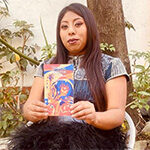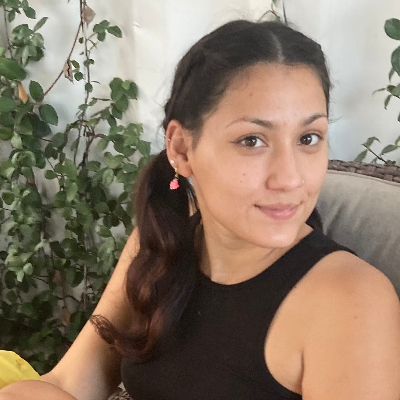Sts’uj xch’ich’el
(una herida sangra)
Sts’uj xch’ich’el ta jch’ulel
ja’ snopbenal jme’ ch-ok’
xchi’iuk ta st’uxijes stsatsal xchijtak.
Ta juju siuel ep ya’lel sat.
Ta sjal batel ts’ijilal li jme’e
Sts’uj xch’ich’el ta jch’ulel.
Ja’ snopbenal jme’ ta stik’ ochel svaechtak
ta jubej vok’emal k’ib.
Sts’uj xch’ich’el ta jch’ulel.
Ja’ snopbenal jme’ ta spuk’
svokol ta jun boch
Chuch’ svokol li jme’e.
A wound bleeds
(sts’uj xch’ich’e)
A wound bleeds in my soul
It’s the memory of my mother who cries
and soaks the wool of her sheep.
For every thread, thousands of tears.
My mother knits a long silence.
A wound bleeds in my heart.
It’s the memory of my mother pouring out her dreams
in a broken vessel.
A wound bleeds in my heart.
It’s the memory of my mother revolving
her despair in a jícara.
My mother swallows her pain.
Nutsel
(destierro)
Ch’ayemotik ta o’ontonal li antsotike
oy jvokoltik skoj ti bats’i antosike
nutsbilotik ta kosilaltik:
li vokolile ta stek’li jch’uleltike,
ta sjipotik ta at o’ontonal.
Ta sbulik lok’el xchi’’uk ta smukik
jvaechtik.
Nojem ta chopolil li yo’ontonike
ta smilik li ch’ul banamile.
Mukbil yech’omal ketik
ta jk’antik vokol.
Exile
(nutsel)
We have been forgotten women,
suffering for being Tsotsil women,
dispossessed of our territories:
the pain tramples our souls,
it exiles us to an underworld of loneliness.
They drag out and bury
our dreams.
The hate that nests in their hearts
poisons the sacred mother earth.
Our buried bodies
cry out with voices of protest.
Ak’otajan
(danza)
¡Ants!
Ak’otajan yu’un li k’ak’ale chjelav ta anil.
Mu xa mala chacham xchi’iuk avokoli:
ak’o yich’ batel li ak’obale
ak’otajan ta stekel akapemal
¡Ants!
Ak’otajan xchi’uk abek’tal
yu’un chilbajinik skoj ti ik’yamane.
Mu xa vak’ ta avo’onton:
jo’ote ak’otajan.
Ak’otajan xchi’uk yip ayayatak.
Koltao stekel avokol,
ats’ijilal,
ach’ayel ta o’ontonal
¡Ants!
Ak’otajan.
Dance
(ak’otajan)
Woman!
Dance because time is passing.
Don’t wait to die in suffering:
let the night take it away.
Dance with all your bravery.
Woman!
Dance with your body of clay
which many despise for its color.
It doesn’t matter:
you dance.
Dance with the strength of your grandmothers.
Free yourself from that pain,
that silence
that nothingness.
Woman!
Dance
Mi mu’yuk li sut ta jnae
(si un día no vuelvo a casa)
Mi mu’yuk li sut ta jnae
–mi li ch’ay jun k’ak’al
mi lajemun xa taikun–,
mu xa vok’itaun, kuni me’.
Ja’ no’ox ta jk’anbot ich’bo yip jyayatak
sa’o lekilal
ta stekel antsetik ti milbilike:
antsetik oy sbi’ik
oy svaechik xchi’uk slo’ilik:
antsetik chukbilik
ta sna’il at o’ontonal.
Mi mu’yuk li sut ta jnae
mu xch’ay ta ajol yu’un ta jtajbatik
ta jun sakubel osil.
If one day I don’t return home
(mi mu’yuk li sut ta jnae)
If one day I don’t return home
—if one day I disappear,
if they find me dead—
don’t cry for my death, dear mother.
But I ask you take up the courage of my grandmothers
and seek justice
for all murdered women:
women with names,
with lives and dreams:
women now confined
in a labyrinth of tears.
If one day I don’t return home,
don’t forget we will find each other
in the next dawn.
Translated via the Spanish by Isabella de Paolo as part of a translation course taught at St. Mary’s University in San Antonio, Texas by LALT Indigenous Literature Correspondent Christian Elguera
From Tenbilal antsetik = Mujeres olvidadas (Fondo de Cultura Económica, 2022)



